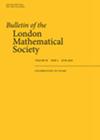Perfect powers in elliptic divisibility sequences
IF 0.8
3区 数学
Q2 MATHEMATICS
引用次数: 0
Abstract
Let be an elliptic curve given by an integral Weierstrass equation. Let be a point of infinite order, and let be the elliptic divisibility sequence generated by . This paper is concerned with a question posed in 2007 by Everest, Reynolds and Stevens: does contain only finitely many perfect powers? We answer this question positively under the following three additional assumptions:
椭圆可除序列中的完全幂
设 E / Q $E/\mathbb {Q}$ 是由韦尔斯特拉斯积分方程给出的椭圆曲线。让 P ∈ E ( Q ) $P \in E(\mathbb {Q})$ 是一个无穷阶点,让 ( B n ) n ⩾ 1 $(B_n)_{n\geqslant 1}$ 是由 P $P$ 产生的椭圆可分序列。本文关注 Everest, Reynolds 和 Stevens 于 2007 年提出的一个问题:( B n ) n ⩾ 1 $(B_n)_{n \geqslant 1}$ 是否只包含有限多个完全幂?在以下三个附加假设下,我们可以肯定地回答这个问题:
本文章由计算机程序翻译,如有差异,请以英文原文为准。
求助全文
约1分钟内获得全文
求助全文
来源期刊
CiteScore
1.90
自引率
0.00%
发文量
198
审稿时长
4-8 weeks
期刊介绍:
Published by Oxford University Press prior to January 2017: http://blms.oxfordjournals.org/

 求助内容:
求助内容: 应助结果提醒方式:
应助结果提醒方式:


